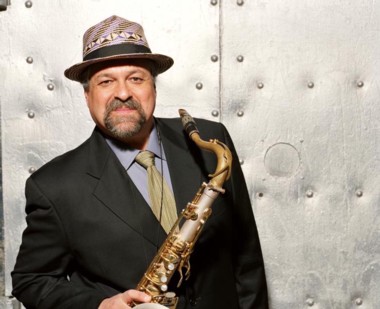A quarter-century is, by any marker, a milestone. But for a music series—a phenomenon which seems so often born of good will but raised by bad parents—to last 25 years is a testament to something deeper than just survival. To last in that arena, a series must be not only loved by its creators, but by its participants, its audience, and the community in which it makes its home. The Magic Triangle Jazz Series at UMass, now celebrating its own silver anniversary with a trio of diverse concerts, has done that and more.
Launched in 1990 by a group of jazz DJs that included locals Glenn Siegel and Peter Sokolowski, the series has brought some of the leading lights of jazz to the Pioneer Valley over the decades. If the musicians were not always household names in homes where the radios were tuned to the Top 40, they were nonetheless recognized by the cognoscenti as musicians operating at the highest levels: these were artists like Cecil Taylor, William Parker, and Yusef Lateef, who was 90 years old when he performed his duo concert with Adam Rudolph in the autumn of 2009.
Sokolowski—who still slips away from his gig as editor at large for Merriam-Webster to substitute as a radio host for WFCR—seemed surprised that it had been 25 years, and downplayed his early involvement when asked about the series’ conception. “My own memory is that the credit really goes to Glenn, then and now, for bringing great world-class music to the Valley. It’s a legacy of amazing music.”
It was an idea Sokolowski describes as “brilliant and simple. The musicians clearly loved coming to a place where they were appreciated and treated with so much respect… this wasn’t a bar gig.” Over two decades later, Sokolowski still has the signed posters from that first year.
Siegel, who continues to run the series, has stayed on at UMass as administrative advisor for campus radio station WMUA. He has certainly been the sustaining force behind the series, helping to shape not just its musical path but also the wider goals he writes about in Close to the Music, a collection of photos, essays, and remembrances, published to commemorate the quarter-century milestone. The mission of the series, he writes, “then and now, has been ‘to provide the community with an intimate and unique performance experience at an accessible price, presenting artists whose critical reputation exceed their place in the public eye.’” At the same time, Siegel has never lost the pure enthusiasm of a true fan of the music; he marvels at getting to be a part of “an endeavor that has given me unfettered access to the most illustrious, iconoclastic and creative musicians of our time,” calling it “a joy and privilege to bring these master musicians to Amherst each year to share their work with a couple hundred of my (old and new) friends.”
Musicians, it turned out, felt largely the same way about Siegel and the welcoming and appreciative atmosphere of Magic Triangle. Unlike many jazz festivals, Magic Triangle has never been narrow-minded; where many focus on crowd-pleasing swing or (maybe) early bop, Siegel’s series pulls in a wide variety of avant-garde artists that don’t fit into what jazz journalist Ed Hazzell calls the “tidy Lincoln Center version of jazz.” Those artists found a creative home in Amherst, and Close to the Music is brimming with their praise.
The celebration of it all got underway in February with a concert by saxophonist, composer and Amherst College Assistant Professor of Music Jason Robinson. To help recreate some of the sounds of his 2012 album Tiresian Symmetry, Robinson brought in his nine-piece Janus Ensemble to fill Bezanson Recital Hall with music inspired by both the ancient (Greek myth) and the modern (Henry Threadgill).
The next concert in the series will come on March 13 at Bowker Auditorium, from drummer and UMass faculty member Tom Giampietro (each of the three concerts is being arranged under the aegis of a different faculty member from one of the Valley’s colleges), who brings in bassist Mark Helias and sax giant Joe Lovano to help him pay tribute to their bandmate, the late legend Ed Blackwell. Blackwell, whose watershed work as a drummer in Ornette Coleman’s groups earned him a place in the history books, actually played the Magic Triangle series himself back in 1992, shortly before his death.
That’s a nice touch of continuity that only a long-running series like the Magic Triangle can provide. Indeed, it’s not hard to imagine (though some might find it morbid) that some of this year’s performers will themselves someday be the subject of musical tributes; Lovano’s continuing popularity with critics and crowds alike has led The Wall Street Journal to call him “jazz’s answer to George Clooney…a vibrant player who delivers an award-worthy performance every time out.” Again, a testament to the series’ strength: imagine a local film festival where George Clooney showed up—and then remember that Magic Triangle does that every year.
The final show comes on April 17, when saxophonist, composer and Hampshire College Associate Professor of Music Marty Ehrlich brings his 17-piece Large Ensemble to Bezanson to perform his celebrated new work “A Trumpet in the Morning.” A genre-straddling musician equally at home in the worlds of jazz and classical, Ehrlich has performed with the New York City Opera, the New York City Ballet, and the Chamber Music Society of Lincoln Center, as well as a dizzying Who’s Who of jazz names over the almost four decades since his arrival in New York. Named by The Village Voice as “the most formidable multi-instrumentalist since Eric Dolphy,” in 2004 Ehrlich received a Guggenheim Foundation fellowship in music composition. It should prove a great way to cap off one quarter-century of great music, and to count off the start of the next.•
Jack Brown can be reached at cinemadope@gmail.com.



